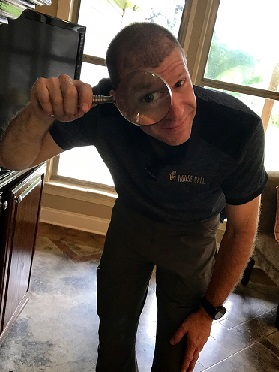One of the most exciting things about being a home inspector is the range of personalities that we come across in our business. While most people we meet are fairly even keeled and down-to-earth, we occasionally cross paths with someone who really makes us appreciate all those “normal” people we encounter in our business.

I recently had a client who was dealing with a very difficult seller. Now, we can certainly have an in-depth discussion about whether having to deal with a difficult person in a real estate transaction is the fault of the real estate agent, the fault of the home inspector or whether it happens for some other reason. But we can all agree that there are certainly enough people out there who are difficult to deal with simply because they’re difficult to deal with.
The reason why they’re difficult is not something that I’m really concerned with, as the source of their difficulty is probably not going to have much bearing on the way I do my job. The thing that I need to be concerned with is making sure that I protect myself in every way possible, as people that are difficult before the inspection starts are unlikely to get any better after I issue my findings.
Now if you’ve read my other posts, then you know that I do everything in my power to attempt to stay away from situations like this. Chances are that if this had been a different real estate agent, I would have excused myself from the inspection. However, given the fact that I have known this agent for a long time and consider her to be a good friend, I felt obligated to perform the inspection, if for no other reason than to help protect her from the oncoming train.
The only real defense is active defense.
Mao Zedong
So, my brain jumps into overdrive and I start to work through all of the things that I need to do to protect myself from the coming tsunami. My first thought is that I need to figure out exactly what’s going on with this sale. In this particular situation, we have a house that had been on the market for a long time but had not sold, as the local real estate market had been in a bit of a slump. The seller decided to take it off the market and lease the house to a friend that needed somewhere to live for a short period of time. After a little while, the seller contacted the real estate agent and wanted to put the home back on the market, as home sales were increasing in their area and he thought he had a better chance of selling the property this time around.
The agent was a bit apprehensive about listing the house again, as the seller had been difficult to work with the first time around, and all signs indicated that this time was going to be more of the same. The seller instructed the agent that he wanted to put the house up for sale, but was not willing to lose the lease income, so the tenant was going to keep living there while the house was being marketed and shown to potential buyers. This arrangement was obviously not going to be conducive to an easy sale, and should have been a warning sign to the agent that this was probably not going to be something she wanted to get involved in.
But the lure of a commission check is a hard thing to say no to, so she took the client back and got to work. Eventually, my clients put in an offer on the property and started working through the process of negotiations. After getting an accepted offer, my clients were ready to proceed with the home inspection, however the seller had other ideas on how things were going to progress.
The seller demanded that the buyers show they were approved for their loan before he would allow them to inspect the property. And he wasn’t simply looking for a pre-approval letter (which is the industry standard); he wanted a specific approval letter from their bank before allowing the inspection to happen.
Now, this is not something that typically happens in my part of the country, and I assume that it’s probably not standard operating procedure in any other regions either. A simple pre-approval letter is all that’s normally required to show that a buyer is going to be able to finance their home purchase. However, this seller was demanding that things be done his way.
I don’t know if his real estate agent didn’t explain to him how things typically work when selling a home, or, as I believe is more likely, he was just an incorrigible human being and demanded that everything was going to progress exactly the way he wanted it to happen. I’m sure that his agent was making an earnest attempt to explain how the process typically works, but it was easy to see that this seller was one of those people who demand that things are to be done his way or they won’t be done at all.
The buyers seemed to be in love with this property, so they were willing to put up with all this drama in order to buy the “home of their dreams.” They were able to secure an approval letter from their lender, and we (eventually) proceeded to the home inspection phase.
Here’s where it started getting a bit more interesting for me.
The seller instructed the buyers that they had already seen the house, so they (and their agent) were not going to be allowed back in the house for the inspection. He would be there to let me in, and only I would be allowed to go into the property during the inspection. Again, a situation that is highly unusual for our area. In our region, the buyers and their agent are typically present during the home inspection, which I prefer, as over the years I’ve found that I have more post-inspection problems when the clients do not attend the inspection. Because of his insistence on being the one who dictated the entire situation, and his constantly changing schedule, the inspection had to be rescheduled a few different times before it actually happened.
It was quite unusual to have this much drama surrounding a home inspection, particularly before I even step foot on the property. (Usually all the drama comes after I present my findings!) And honestly, this is a classic example of the type of situation that I would normally walk away from, explaining that there had been a mistake when the inspection was scheduled, as I was actually already booked for this time slot. I would apologize profusely, letting them know that my schedule was fully booked for the foreseeable future, and generously offer the phone number to one of my competitors, assuring them that he would be able to do their inspection much sooner than I could.
With all these problems, numerous phone calls back and forth to set up the inspection, insistence on changing the time and date a few different times, strange demands on who was going to be allowed on the property (he even tried to tell me how much time he was going to allot me for the inspection), I knew that I was going to be in for a heap of trouble. My Spidey-sense was tingling, and this one had long-term drama written all over it.

Unfortunately, because of my close relationship with the buyers’ agent, I felt duty-bound to go through with the inspection. I could easily see what I would be facing in the coming weeks (contentious phone calls, challenges to my finding, emails back and forth with his contractors, etc.), and knew that I’d better be on the ball with my report, because it would serve as my main source of information (and defense) in this particular case.
I contacted my clients’ agent, to see if I could glean any other information that may help me in my job. I found out the buyers were moving here from out of state, and the closing date on their current residence was fast approaching. They would soon have everything they owned pack into a moving van, headed towards Louisiana with the intent on moving into their new home. This meant that the buyers were in a very weak position, with (essentially) no bargaining power whatsoever in this negotiation. At this point, the seller knows their situation, so he has full reign to be as much of an ass as he wants, as he knows the buyers are desperate to have a place to move their family into when they arrive in a moving van packed full of their stuff.
Now, here’s where it really starts getting interesting.
The seller had told everyone that the tenants had already moved out, and that the property was vacant and ready for inspections. However, my clients’ agent had driven by the property on a few different occasions, and she was certain that someone was living there, as there were always more than a few cars in the driveway. So, I’m thinking that the seller has probably not even notified his tenants that the house is being sold and that they have no idea that I’m coming to do an inspection.
There’s no better feeling than knocking on a tenants’ door and surprising them with the information that their house is being sold out from under them, and oh, by the way, I’m here to inspect it right now… That usually doesn’t end up producing the most productive conversation, and normally ends up being a total waste of my time, as I’m typically not getting access to the property at that point. So, in this situation, I knew it was important for me to get assurance that the tenants were aware of what was happening, and that they were expecting my arrival for the home inspection.
Once all those hurdles had been crossed, it was (finally) time for the inspection. The seller met me at the house and the tenants vacated the property while I performed the inspection. Surprisingly, the seller was quite cordial and didn’t really bother me while I did my thing, only asking a few cursory questions at the beginning and end of the inspection.
I knew, however, that I needed to cover my butt nine ways to Sunday. Thankfully, we have an easy, built-in way to protect ourselves during an inspection: pictures. I normally take a good number of pictures during a typical inspection, as I find they’re an easy way to explain my findings, portray a sense of value to my client through my report and document the events of and conditions during the home inspection. In situations like this, where I’m uncomfortable about some aspect of the inspection (such as restricted access to numerous areas, contentious inspection parties, suspicious questions or requests, agents of questionable moral fiber or any buyers or sellers that are attorneys or engineers), my picture count goes through the roof.
I typically don’t take pictures that are not going to end up as part of the inspection report, but in situations like these I make sure that I have enough pictures of the conditions that existed during the inspection to defend myself if the need arises. These extra photos are placed in a file (with a copy of the final inspection report) that can be easily referenced if needed.
In this particular case, since this “unique” seller was not allowing my clients back into the house, I forwarded a copy of all the pictures to my buyer, so that they had a better sense of the property condition and felt more comfortable with their purchase.

Ironically enough, even though my realtor friend entertained me with numerous reports of the unproductive negotiations, desperate acquiescence and contentious closing, my findings were never called into question. I’m not sure if it was because I did such a good job in covering my ass or because the seller didn’t really budge on anything so not much was repaired to begin with, but after having so much trouble getting to inspection day on this property, (for me) things went off without a hitch.
Cases like these are generally the exception, rather than the rule, for home inspectors. Most of our job is pretty routine: roof, attic, electric panels, appliances, walls, ceilings and floors. A house is a house is a house. Enjoy the monotony that is the life of a professional home inspector. But when a crazy person sticks their head out of their little hole and tries their best to interrupt your perfect little world, be prepared, camera in hand, to cover your butt nine ways to Sunday. You’ll be glad you did.
The best defense is a good offense.
Jack Dempsey
I welcome all feedback (both positive and negative) on this post.
Please take a moment to leave a comment below. Thank you!
Want to be an Influencer in Your Field? Share This Post!
Thanks, Joe

